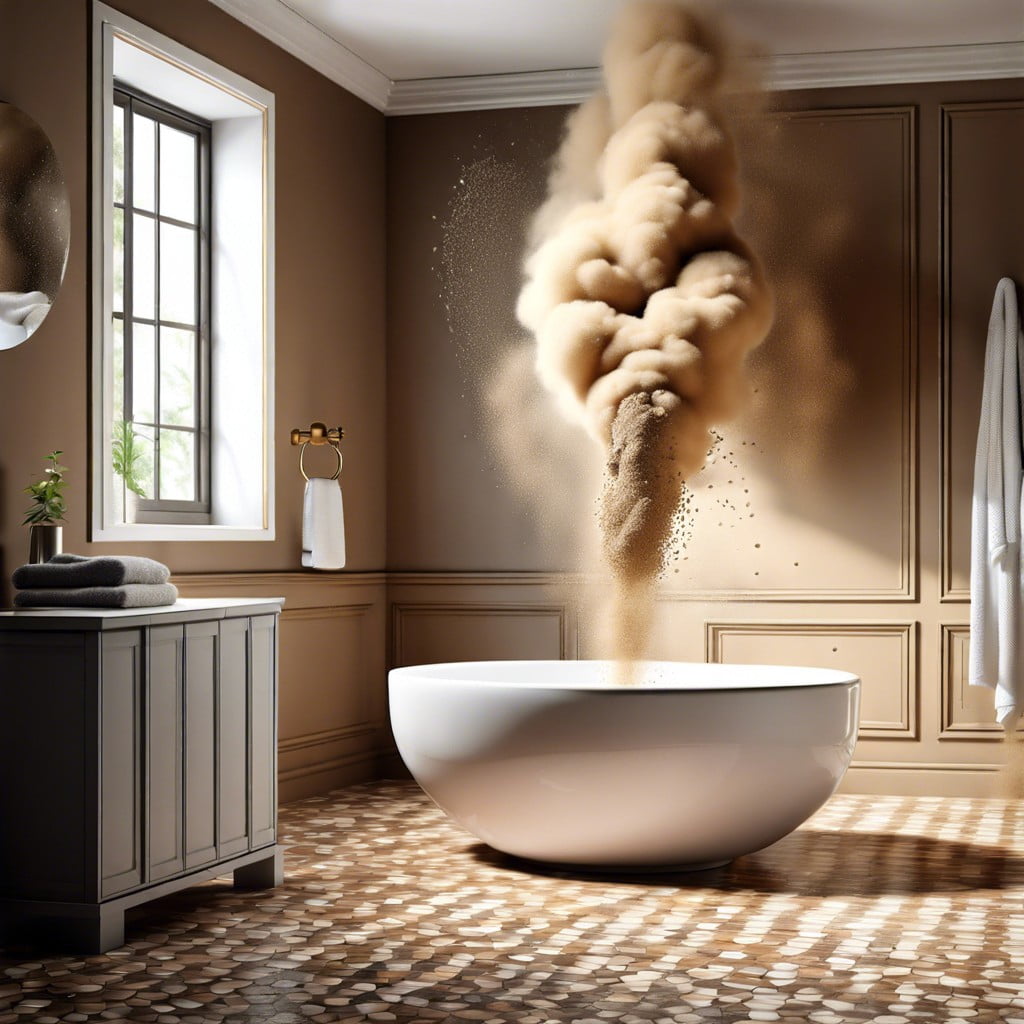Last updated on
This guide provides crucial insight into the various causes of a musty smell in the bathroom, practical preventive measures, and effective solutions to deal with this common issue.
Key takeaways:
- Mold and mildew thrive in damp bathrooms with poor ventilation.
- High humidity levels contribute to musty smells in the bathroom.
- Proper cleaning techniques can combat stubborn musty odors.
- Strategies for preventing mold and mildew include ventilation and leak repair.
- Practical tips for keeping the bathroom fresh include ventilation and moisture control.
Common Sources of Musty Bathroom Odors
Mold and mildew love to make their home in bathrooms, thriving in the corners of showers and beneath sinks where leaks might go unnoticed. The lack of ventilation only adds to the issue, trapping moisture and creating the perfect breeding ground for these unwelcome guests.
Then there are those oft-forgotten bath mats and towels; when left damp, they contribute to the all-too-familiar musty orchestra.
Lastl
The Relationship Between Humidity and Musty Smells
High levels of humidity offer the perfect playground for spores to turn your bathroom into a petri dish of funky smells. Lingering moisture from showers and baths escalates the problem by providing mold and mildew with a constant source of sustenance, thus exacerbating the musty odors.
Poor ventilation exacerbates this further, essentially trapping humidity and allowing it to seep into walls, towels, and even your bath mat. Investing in a hygrometer to monitor humidity levels can be a game-changer, giving you real-time insights to fend off the invisible moisture bandit before it whips up a smell storm in your sanctuary.
Remember, keeping humidity below 50% is key; it’s the invisible threshold where musty odors often surrender.
Tackling Musty Smells With Proper Cleaning Techniques
Combatting stubborn musty odors requires a diligent cleaning regimen. Consider the following steps to refresh your space:
Use a vinegar solution: Mix equal parts of white vinegar and water. Spray onto suspected areas such as grout lines and corners, then scrub with a toothbrush.
Choose the right cleaner: Opt for cleaners with mold-killing ingredients like bleach or hydrogen peroxide. However, never mix cleaning agents, as this can create dangerous fumes.
Dry out the area: After cleaning, thoroughly dry the space with towels or a fan. Moisture supports odor-causing growth, so keeping surfaces dry is crucial.
Clean shower curtains and mats: These often overlooked items can harbor mold. Wash them in hot water with laundry detergent and consider adding baking soda for added odor elimination.
Replace caulking: If cleaning doesn’t overcome the smell, old caulking might be the culprit. Remove, clean the area, and replace it to seal out moisture effectively.
Remember, maintaining a routine will prevent odors from taking hold in the first place. Regular upkeep is key to keeping your bathroom smelling fresh.
Strategies for Mold and Mildew Prevention
Ensuring adequate ventilation is the first line of defense against mold and mildew formation. Open windows during and after showers, or better yet, install a good-quality exhaust fan to expel damp air directly outside, not just into the attic or another room.
Stay vigilant about leaks. Frequently check under sinks, around toilets, and near showers and tubs. Promptly repairing any leaks minimizes moisture buildup, which deters mold spores from taking root.
Using a squeegee on shower walls and doors after use can reduce the moisture that molds crave. Encouraging household members to make this a habit can significantly cut down on mold-friendly environments.
Regularly wash and dry bath mats and towels. These fabrics can harbor moisture and promote mold growth if not allowed to dry properly between uses.
Consider anti-mold paints, particularly if you’re redecorating. These paints are designed with mold inhibitors, making your walls less hospitable to spores.
Lastly, incorporate moisture-absorbing products like desiccants in cabinets or closets prone to dampness. These can help maintain a drier atmosphere, unfriendly to mold and mildew.
Practical Tips for Keeping Your Bathroom Fresh
Embrace the power of ventilation. Ensuring your bathroom has proper airflow is critical. A simple habit of keeping the window open or the exhaust fan running during and after showers can go a long way.
Stay ahead of the laundry game. Wet towels and bath mats are breeding grounds for musty smells. Hang them to dry immediately after use, and wash them regularly.
Invoke nature’s fresh essence. Incorporate plants that thrive in moist environments. Not only do they absorb excess moisture, but they also add a touch of vitality to the space.
Invest in moisture absorbers. Small dehumidifiers or desiccant bags strategically placed in your bathroom can significantly reduce humidity levels.
Scent it strategically. Consider using natural oils or non-overpowering air fresheners to introduce a fresh aroma without overwhelming the senses.
Be vigilant about leaks. Periodically check for and address any leaks, as standing water is often the culprit behind unwelcome odors.
Regularly give your drains some love. Pouring a mixture of baking soda and vinegar down the drain can prevent odor build-up. Flush it with hot water to maintain a clean, fresh-smelling drain.
FAQ
Why does my bathroom smell damp but no leak?
The musty odor in your bathroom is likely due to the growth of fungi such as mold and mildew, which thrive in damp, minimally ventilated environments.
Why does my bathroom always smell musky?
The musky smell in your bathroom is likely due to lingering humidity which invariably creates an environment conducive for mold development.
How do I get rid of a bad smell in my bathroom?
To mitigate unpleasant odors in your bathroom, it’s effective to position an accessible container of baking soda combined with dried lemon powder, or place fresh coffee grounds in a small bowl for immediate odor absorption.
What are the common factors that can cause a musty smell in bathrooms?
Causes of a musty smell in bathrooms often include excess moisture, poor ventilation, mold growth, stagnant water in drain traps, and outdated plumbing fixtures.
How does inadequate ventilation contribute to musty bathroom odors?
Inadequate ventilation in a bathroom contributes to musty odors by trapping moisture and fostering the growth of mold and mildew, which release unpleasant scents.
Can hidden mold be a cause of a persistently musty bathroom?
Yes, hidden mold can indeed be a cause of a persistently musty bathroom.
Recap




